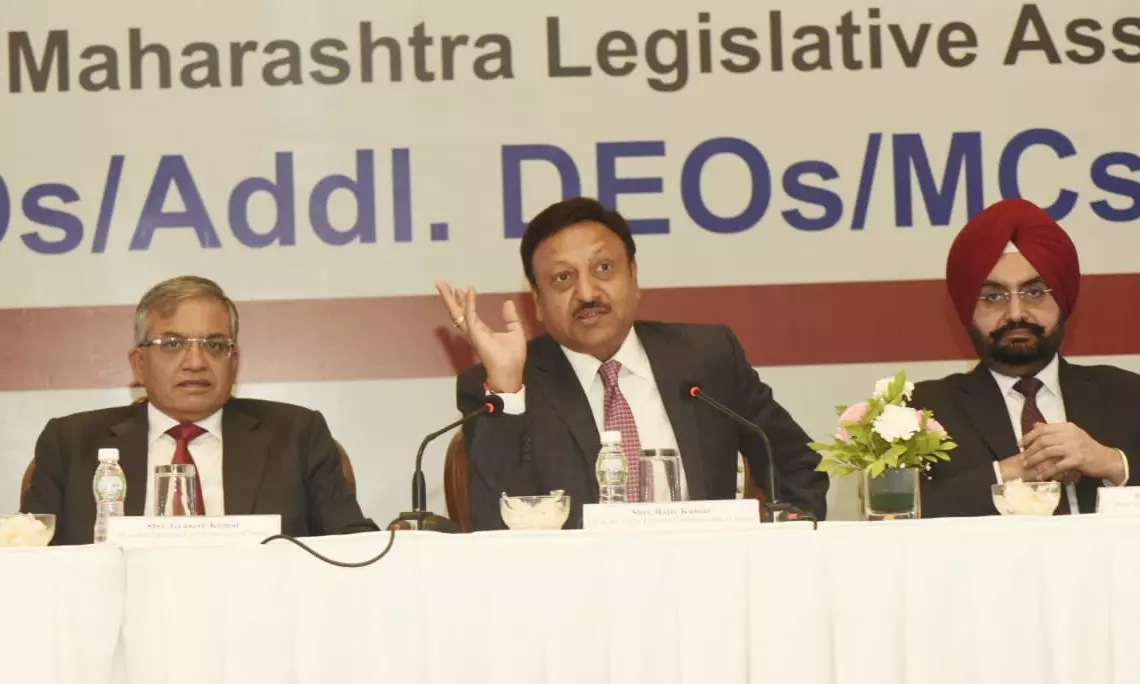
Mumbai: Chief Election Commissioner (CEC) Rajiv Kumar on Saturday confirmed that the Maharashtra Assembly elections will have to be held before November 26 this year. He also indicated that the voting dates will not coincide with Diwali. Regarding Congress’s demand to remove state Director General of Police Rashmi Shukla, the ECI clarified that no officer who has got extension of service or working on contract and doing election related work will not be allowed to interfere with the election process.
Mr. Kumar, along with Election Commissioners Gyanesh Kumar and S.S. Sandhu held review meetings with various stakeholders regarding the poll preparedness for the Maharashtra Assembly. In their two days tour, the ECI delegationmet state government officials including chief secretary Sujata Saunik, the DGP, and law enforcement agencies. They also met representatives of several political parties and sought their suggestions. The CEC and two commissioners on Saturday held a meeting with all the district collectors and SPs over the preparation of the Assembly election.
Mr. Kiukar clarified that there will be no exception and no reconsideration on transfer of officials who have completed three or more years in the same place. The ECI has sought a compliance report in this regard from the Maharashtra Chief Secretary and DGP in two to three days.
However, Mr. Kumar refused to discuss the individual case of DGP Shukla. “We have received written complaints and MCC is not invoked. The Commission does not deal and respond to the individual complaints of the parties. But when we receive such communications, we go through the processes and rigor before taking a decision at an appropriate time,” he said.
Ms. Shukla was due to retire on June 30, 2024, upon reaching the age of superannuation as per her date of birth in June 1964. However, she has been given an extension until January 2026.
When asked if the officer, who is on extension, could lead the state during the election, Mr Kumar said that once the election is announced, every government servant related to election duty comes under the ECI’s control. It is supposed to be deemed deputation to the Election Commission, he said.
The ECI had on July 31 instructed the government and police to transfer all those officials who are posted in their home districts and those who have been in the same place for three or more years. According to sources, the ECI is upset that its instructions were not complied with and insisted that the necessary action should be taken in the next couple days.
Assuring that the ECI will provide level playing field to all political parties, the CEC said, “Efforts are being made to increase the voters’ turnout in the Assembly election by addressing various issues such as urban voter apathy, migration of industrial workers and slum dwellers and lack of sufficient amenities at the polling stations.” He also pointed out at a dismal voter turnout in some of the Mumbai constituencies and said it was a major concern for the ECI.
Referring to the demands of expenditure limit of the candidates, Mr. Kumar said that there will be no change in it. Some of the political parties have made a demand to hike the expenditure limit of Rs 40 Lakh and reduce the valuation of items used in the election. “The expenditure limit was decided for the country. It is not state specific. We have now indexed with inflation and other parameters. We revise it after every two to three years. As of now, there will be no revision and it will remain as it is,” he said.
Mr. Kumar said all candidates, who have criminal backgrounds, will have to give advertisements prominently in newspapers and electronic media three times. “It is right of the voters to know that any candidate has a criminal background. Even the political parties will have to publish advertisements within three days of nominations of the candidates. The political party will have to answer the public: why do they select a candidate with a criminal background so that voters can make informed choices,” the CEC said.
The ECI has planned live webcasts of 50 per cent polling stations in the state, which will be 100 per cent in urban areas. The ECI also said that the political parties will have to publish advertisements in newspapers and electronic media about the candidates and their criminal record.
| ReplyForward |

